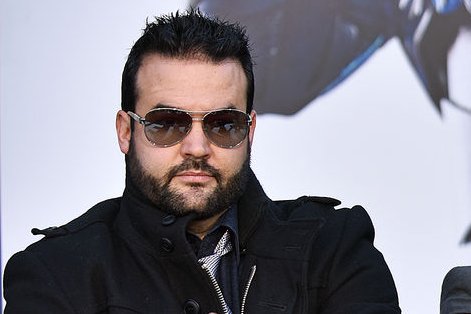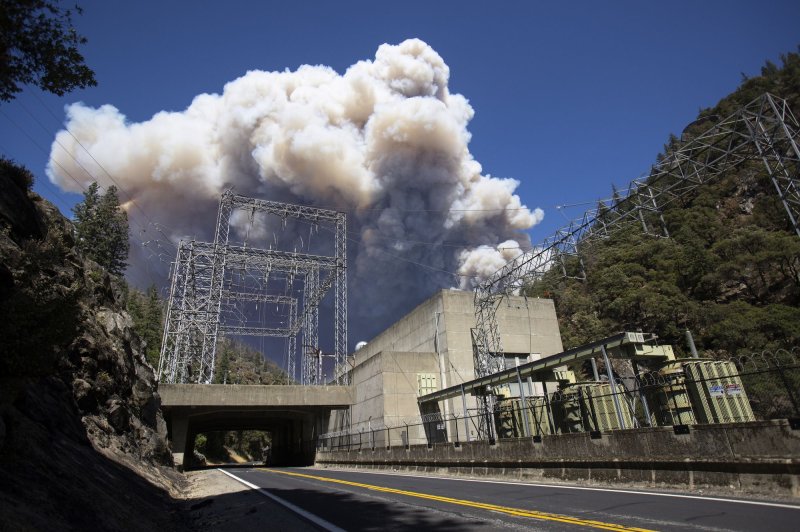
1 of 13
Belarus regiment leader, Vadim Prokopiev, practices at a shooting range near Warsaw, Poland, Friday, May 20, 2022. Belarusians are among the foreign fighters who have volunteered to take up arms in Ukraine against Russian forces. They consider the Ukrainians defending their homeland to be their brethren. And by joining their resistance to Russia's onslaught, they hope to weaken the rule of Russian President Vladimir Putin, and ultimately that of Belarus President Alexander Lukashenko.
(AP Photo/Michal Dyjuk)
WARSAW, Poland (AP) — One is a restaurateur who fled Belarus when he learned he was about to be arrested for criticizing President Alexander Lukashenko. Another was given the choice of either denouncing fellow opposition activists or being jailed. And one is certain his brother was killed by the country’s security forces.
What united them is their determination to resist Lukashenko by fighting against Russian forces in Ukraine.
Belarusians are among those who have answered a call by Ukrainian President Volodymyr Zelenskyy for foreign fighters to go to Ukraine and join the International Legion for the Territorial Defense of Ukraine. And volunteers have answered that call, given the high stakes in a conflict which many people see as a civilizational battle pitting dictatorship against freedom.
For the Belarusians, who consider Ukrainians a brethren nation, the stakes feel especially high. Russian troops used Belarusian territory to invade Ukraine early in the war, and Lukashenko has publicly stood by longtime ally, Russian President Vladimir Putin, describing him as his “big brother.” Russia, for its part, has pumped billions of dollars into shoring up Lukashenko’s Soviet-style, state-controlled economy with cheap energy and loans.
Weakening Putin, the Belarusian volunteers believe, would also weaken Lukashenko, who has held power since 1994, and create an opening to topple his oppressive government and bring democratic change to the nation of nearly 10 million people.
For many of the Belarusians, their base is Poland, a country along NATO’s eastern flank that borders Belarus and Ukraine and which became a haven for pro-democracy Belarusian dissidents before becoming one for war refugees from Ukraine.
Some of the fighters are already in Poland, and some only pass through briefly in transit on their way to Ukraine.
“We understand that it’s a long journey to free Belarus and the journey starts in Ukraine,” said Vadim Prokopiev, a 50-year-old businessman who used to run restaurants in Minsk. He fled the country after a rumor spread that he would be arrested for saying publicly that the government wasn’t doing enough for small businesses.
“When the Ukraine war will be eventually over, our war will just start. It is impossible to free the country of Belarus without driving Putin’s fascist troops out of Ukraine,” he said.
Prokopiev heads a unit called “Pahonia” that in recent days has been training recruits. The Associated Press interviewed him as he oversaw an exercise that involved firing pistols and other weapons into old cars in simulations of war scenarios. They were being trained by a Polish ex-police officer who is now a private shooting instructor.
Prokopiev wants his men to gain critical battle experience, and he hopes that one day soon a window of opportunity will open for democratic change in Belarus. But he says it will require fighters like himself to be prepared, and for members of the security forces in Belarus to turn against Lukashenko.
Massive street protests against a 2020 election widely seen as fraudulent were met with a brutal crackdown, leading to Prokopiev’s belief that no “velvet revolution” can be expected there.
“Power from Lukashenko can only be taken by force,” he said.
On Saturday, a group of men with another unit, Kastus Kalinouski, gathered in Warsaw in the Belarus House, where piles of sleeping bags, mats and other Ukraine-bound equipment were piled high. They sat together, talking and snacking on chocolate and coffee as they prepared to deploy to Ukraine later in the day. Most didn’t want to be interviewed out of concerns for their security and that of family back home.
The unit, which isn’t formally under Ukraine’s International Legion, was named after the leader of an anti-Russian insurrection in the 19th century who is viewed as a national hero in Belarus.
One willing to describe his motivations was a 19-year-old, Ales, who has lived in Poland since last year. He fled Belarus after the country’s security service, still called the KGB, detained him and forced him to denounce an anti-Lukashenko resistance group in a video recording. He was told he would be jailed if he didn’t comply.
Dressed all in black from a hooded sweatshirt to his boots, he admitted to feeling nervous as the moment arrived to head into Ukraine. He had never received any military training, but would get it once he arrived in Ukraine. But just how much, and where he would be deployed, he didn’t yet know.
He said he was going to fight not only to help Ukraine, “but to make Belarus independent.” He said it was also important for him that people realize that the Belarusian people are very different from the Lukashenko government.
It is a dangerous mission, and several of the volunteers from the Kastus Kalinouski unit have died.
Still, fighting in Ukraine can feel less dangerous than seeking to resist Lukashenko at home, where many activists are in prison in harsh conditions.
Organizing the Kastus Kalinouski recruits was Pavel Kukhta, a 24-year-old who already fought in Ukraine’s Donbas region in 2016, suffering burns and the loss of most of his hearing in one ear. He described his unit as a regiment, meaning it would have hundreds of members, but he wouldn’t give its exact number.
Kukhta said that his half-brother, Nikita Krivtsov, was found dead by hanging in a wooded area outside Minsk in 2020. Police have said there was no evidence of foul play, but Kukhta says he and the rest of the family are certain he was killed for joining the anti-Lukashenko protests.
But he insisted that his support for Ukraine in the war is not about revenge, only about fighting for democratic change.
“If Putin is defeated, Lukashenko will be defeated,” he said.
___
Follow the AP’s coverage of the war at https://apnews.com/hub/russia-ukraine

















